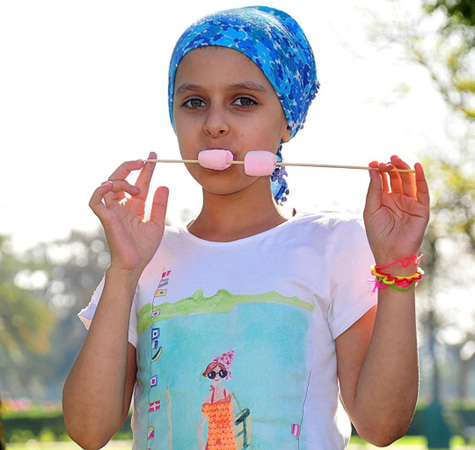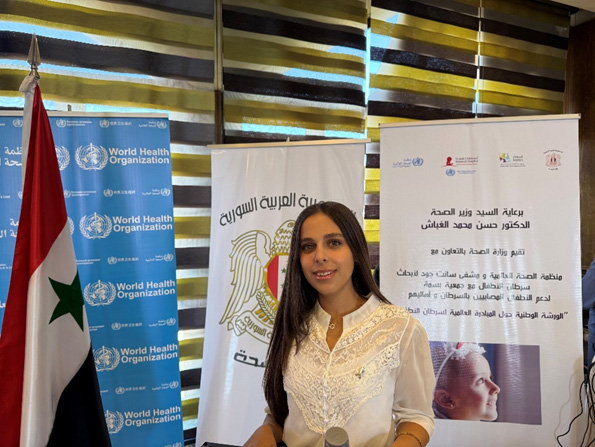 Maya in 2012. She was 10 years old when she started cancer treatment. Photo credit: BASMA23 July 2024 – In Syria, childhood cancer is ranked third among the leading causes of death in the country. Damascus and its suburbs are the main areas where cancer treatment is offered, putting huge pressure on hospitals here to admit children from across Syria. Despite the ever-shrinking availability of cancer services across the country, a network of dedicated organizations and health workers continue to strive to provide life-saving care.
Maya in 2012. She was 10 years old when she started cancer treatment. Photo credit: BASMA23 July 2024 – In Syria, childhood cancer is ranked third among the leading causes of death in the country. Damascus and its suburbs are the main areas where cancer treatment is offered, putting huge pressure on hospitals here to admit children from across Syria. Despite the ever-shrinking availability of cancer services across the country, a network of dedicated organizations and health workers continue to strive to provide life-saving care.
Maya, a young cancer survivor, shares her story, which reflects her patience, strength and an unbreakable spirit of hope.
Maya’s story, in her own words
When I was just 10 years old, my brother and I were playing a game of wrestling in our home in As-Sweida, Syria. I felt a lump in my abdomen, but what seemed like normal stomach pain turned out to be something far more serious. The next day, a CT [computed tomography] scan revealed the shocking news: I had cancer. The diagnosis was abdominal sarcoma, specifically a desmoplastic small round cell tumour. This was July 2012, and the start of a challenging journey.
My mother and I went to Al-Biruni University Hospital in the Harasta suburbs outside of Damascus to begin my treatment. By chance, we found the BASMA association on one of the hospital floors where they treat children with cancer. My mother spoke with the doctors, and soon I was admitted into BASMA’s care to start my treatment.
To receive my chemotherapy doses, my mother and I had to travel each time from As-Sweida back to the hospital in Harasta. This journey was terrifying – the road was deadly, filled with bombings and snipers. But I had no choice, I couldn’t give up.
My treatment was complex. I had surgery for my chemotherapy to be given through a port because my arteries had hardened. The pain of each dose was immense, like a fire burning inside me. Isolation became my new reality as my immune system weakened, and I was cut off from the world and school. Every time I visited the hospital, I would see other children battling their own challenges. I often wondered why I had survived and what purpose my life now held.
The year 2015 marked one of the most beautiful moments of my life – 3 years after this journey began, I learned I was in remission. My condition improved.
There was, however, a heavy cost. Because of the cancer treatment, I can never be a mother. This reality is painful, but I have decided to remain strong.
Today, at 24 years old, I look back on that time with gratitude. I graduated from the faculty of business administration with a score of 99% and I am now in my second year of studying media. My ambitions are boundless. I speak at TEDx, volunteer with BASMA and the Syrian Arab Red Crescent, and cherish my Syrian heritage.
WHO’s ongoing support to BASMA
 Maya in 2024. With her cancer in remission since 2015, her ambitions are boundless. Photo credit: WHO/WHO SyriaIn 2024, WHO’s support to BASMA aims to provide comprehensive care for children with cancer, like Maya, and encompasses both medical and psychosocial aspects. The initiative emphasizes the importance of holistic support: the social, psychological, spiritual and functional dimensions are crucial during the treatment process, and upon recovery, while patients face a gradual return to daily life.
Maya in 2024. With her cancer in remission since 2015, her ambitions are boundless. Photo credit: WHO/WHO SyriaIn 2024, WHO’s support to BASMA aims to provide comprehensive care for children with cancer, like Maya, and encompasses both medical and psychosocial aspects. The initiative emphasizes the importance of holistic support: the social, psychological, spiritual and functional dimensions are crucial during the treatment process, and upon recovery, while patients face a gradual return to daily life.
In the past 5 years, with generous donations from Japan and Kuwait, WHO has provided BASMA with advanced diagnostic medical equipment to enhance cancer treatment. This support includes 2 polymerase chain reaction (PCR) machines and 2 safety cabinets, 30 chemotherapy beds, anaesthesia machines, a spectrophotometer for chemistry tests, a haematology analyser, and a flow cytometer for treatment follow-up.
These contributions have significantly strengthened BASMA’s capacity, enabling the association to double the number of children it is able to admit annually.
WHO and BASMA are working to scale up this initiative over the years to come, to ensure that all children with cancer in Syria can access life-saving care, wherever they live.


